US Denounces Iran's Supreme Leader ‘Egregious Antisemitic’ Remarks
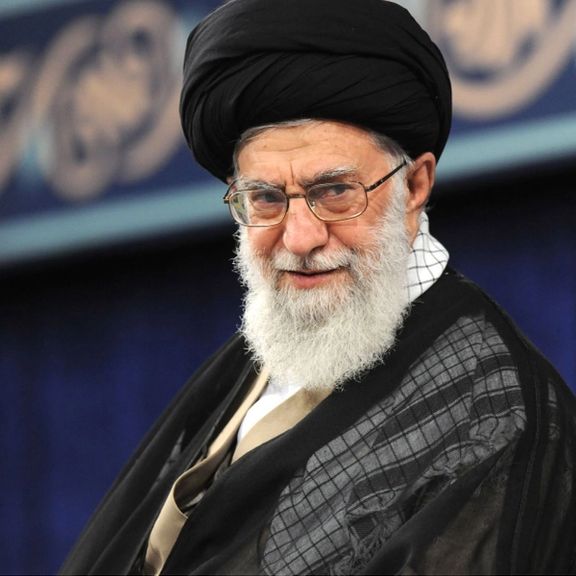
The US special envoy to monitor and combat antisemitism has decried remarks by Iran’s Supreme Leader Ali Khamenei, describing them as “unacceptable and dangerous.”

The US special envoy to monitor and combat antisemitism has decried remarks by Iran’s Supreme Leader Ali Khamenei, describing them as “unacceptable and dangerous.”
In a tweet on Thursday, Deborah Lipstadt said, “We denounce this continued, egregious antisemitism,” adding that “This rhetoric is unacceptable – not to mention dangerous – especially from a head of state.”
Calling on the Islamic Republic to end its antisemitic stance towards the world, she said, “It must cease.”
She was replying to a tweet by Khamenei’s official account who said a day earlier, July 27, that described the Western powers as “mafia,” noting that “At the top of this mafia stand the prominent Zionist merchants, and the politicians obey them. The US is their showcase, and they’re spread out everywhere.”
His remarks came as tensions have been simmering between Iran and Israel in the recent weeks with Israel making alliances with the regional countries against the Islamic Republic and Tehran claiming that it has dealt severe blows to Israel without mentioning any concrete event.
Earlier in the week, Israel’s envoy to the United Nations Gilad Erdan told Iran International that Iran is enriching uranium almost to military-grade, noting that “This is a clear threat to the security of our region and to the whole world. It needs to be addressed by this Security Council, and this Council is silent.”
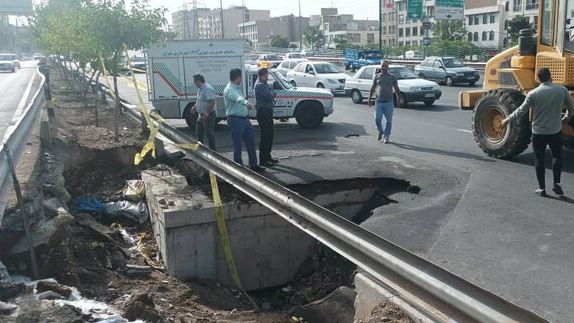
Ground collapse in the heart of the capital Tehran Thursday once again highlighted the many dangers that Iran’s industrial and financial center may be facing.
According to local media the ground collapsed at 7:40 in Sepah Ave in central Tehran. Chief of Tehran police information center, Ali-Asghar Sharifi, told the media that police and other authorities were working at the scene to secure the area and redirect traffic. The incident had no casualties.
There have long been concerns about earthquakes in Tehran as it sits on tectonic fault lines. Ground subsidence, however, resulting from drought and excessive extraction of water which is likely to become more serious in the future adds a new concern and danger to the densest population center in Iran.
Ground subsidence in urban areas can result in power outages, bursting of gas pipes, deformation of rails, emergence of sinkholes, tilting of buildings, and appearance of cracks and ditches in roads and even loss of human life.
Mohammad Aghamiri, chairman of Tehran City Council’s development committee on Thursday described ground subsidence as a time bomb ticking under the city and criticized the authorities for only watching idly without taking any measures to prevent disaster from happening.
This is not the first instance of ground subsidence in Tehran where smaller fractures and cracks are quickly becoming common in some areas of the city, particularly south and southwest.
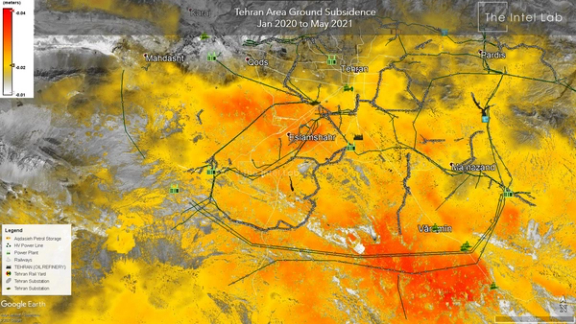
According to the latest official data by Iran’s Geological Organization, the rate of subsidence in the plains around Tehran was between 17 and 24 centimeters per year. The deputy chairman of the environment committee of Tehran City Council, Mehdi Babaei, said recently that ground has subsided by as much as 20 centimeters (8 inches) a year near Shahriyar in southern Tehran.
Ali Saberi, a geologist told local media in 2021 that one million hectares of land in the country is affected by subsidence and the main cause is unlimited extraction of ground water.
Intel Lab intelligence and imagery consulting firm in July 2021 said a brief study it had conducted based on a dataset of 14 pairs of satellite images showing various areas of Greater Tehran indicated a maximum average subsidence rate of 4 centimeters/year.
Huge cracks and hollows that resemble meteor craters have appeared in other parts of the country. In urban areas subsidence has caused cracks in walls and in roads.
One of the most affected areas is the historical city of Esfahan in central Iran where the damage to monuments and the international airport have been cause of much concern.There are photos on social media of huge cracks in the ground around the airport, and of hollows in and around Esfahan’s historical buildings.
Iran has been experiencing consecutive droughts for more than a decade in addition to what many lawmakers and journalists have called years of water mismanagement. Illegal deep wells drilled all over the country for irrigation of agricultural land have depleted underground water reserves in many areas.
Alireza Shahidi, head of Iran’s Geological Organization said in March that land subsidence is a “silent earthquake” that can lead to political and security crises.
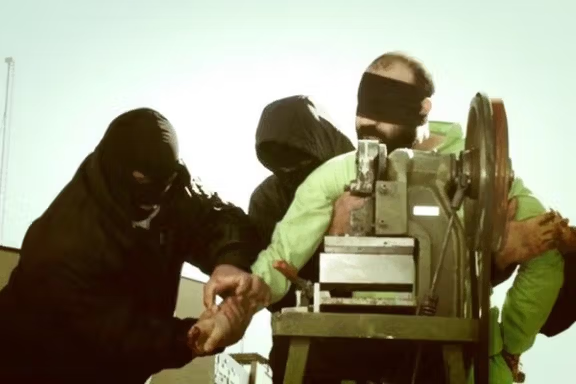
Despite numerous calls by Iranian and international human rights defenderss, the Islamic Republic cut off four fingers of a convict in Tehran’s Evin prison.
Former political prisoner and civil rights activist Arash Sadeghi said on Wednesday that the sentence the prisoner who was tried for theft was executed in Evin prison infirmary.
The sentence was reportedly carried out with a guillotine-like device in the presence of the prosecutor and judicial officials.
This is the second amputation sentence in the prison in less than two months. In June, four fingers of another prisoner were cut off with the guillotine reportedly installed at the infirmary a month earlier to carry out such sentences.
Earlier in July, the chief prosecutor of Iran’s Khorasan Razavi province said several cases of amputations for robbery are currently at the execution stage, and called on judges not to hesitate to issue death and amputation sentences.
Late in June, the head of the Iranian association of surgeons, Iraj Fazel, called on the judiciary not to sanction the amputation of fingers to punish thieves, describing the practice as "worrying and horrifying."
According to Islamic Sharia law, punishment for theft can be amputation of fingers or hands.
Iran’s judicial system is repeatedly criticized for ignoring standard human rights while right groups say the country has embarked on an execution spree at a “horrifying pace” with at least 251 deaths since the beginning of 2022.
On Wednesday, four people were executed while one of them – identified as Mohsen Safari and charged over drug trafficking – was suffering from bipolar disorder, a condition that can make one act on impulsive decisions with no regard for consequences.
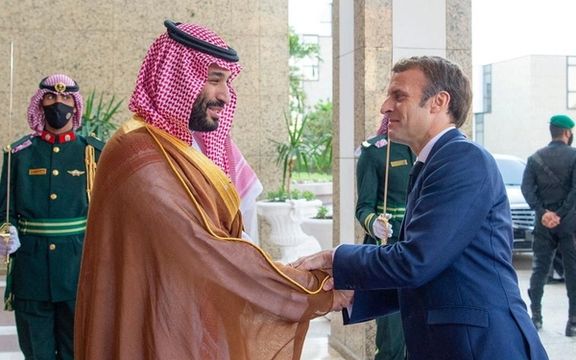
Iran sits on a crowded agenda as French President Emmanuel Macron hosts Saudi Crown Prince Mohammed bin Salman in Paris Thursday evening.
Ahead of Prince Mohammed’s arrival, a presidential official said there was still time to save the 2015 nuclear deal, the JCPOA (Joint Comprehensive Plan of Action), despite widespread skepticism that Tehran and Washington can bridge their differences.
Saudi Arabia is known for having oppsed the deal with Iran and together with its other Persian Gulf Arab allies has drawn closer to Israel as a way of defending agianst the Iranian threat.
The European Union has acted as mediator in trying to keep the JCPOA revival talks alive, after a pause since March, with reports this week that EU foreign policy chief Josep Borrell had floated a proposal reportedly for a partial restoration based on US concessions over oil sanctions and Tehran restoring closer monitoring by the International Atomic Energy Agency (IAEA).
The Saudi crown prince’s trip to Paris comes two weeks after he hosted US President Joe Biden and apparently marks his greater acceptance internationally four years after Washington Post journalist Jamal Khashoggi was killed in the Saudi consulate in Istanbul.
DAWN, a pro-democracy group Khashoggi created three months before his murder, filed a complaint in Paris Thursday calling for the criminal prosecution of Prince Mohammed under universal jurisdiction and France’s commitment to United Nations conventions on torture and enforced disappearances.
Agnes Callamard, Amnesty International’s Secretary General, wrote on Twitter that the “rehabilitation of the murderous prince” was the result of “bargaining.” Both France and the US want Saudi Arabia to raise oil production, so bearing down on rising prices. Both are also major arms suppliers to Riyadh, as well as to the United Arab Emirates.
Raisi: Iran armed forces ‘prepared’
While seeking to improve its own armed forces, Saudi Arabia has been involved in developing cooperation, under US auspices, with Israel over air defense largely against the threat of Iranian and Iranian-supplied missiles and drones.
In the Shahid Nojeh air base, Hamedan province, Thursday Iranian President Ebrahim Raisi suggested that “regional countries” could “feel secure” due to Iran’s role.
“Our great military advances have given us power,” Raisi said. “The enemy studies our movement and preparedness – not that it doesn’t want to attack us, but it cannot take such a step because our armed forces have great preparedness. Both the supreme leader, the commander-in-chief [Ali Khamenei], and the government have said repeatedly that anyone who tries to violate our country will strongly regret it.”
Raisi drew particular attention to Iran’s presence on the “high seas in international waters.” Naval tensions in the Persian Gulf and further afield have included US pressure to stop Iran’s oil exports. Following a recent ruling by the Greek supreme court, an Iranian-flagged tanker anchored off Piraeus is expected to retrieve part of its cargo, which had been confiscated by the US in a move that prompted Iran to seize two Greek tankers – which it still holds – in the Persian Gulf.
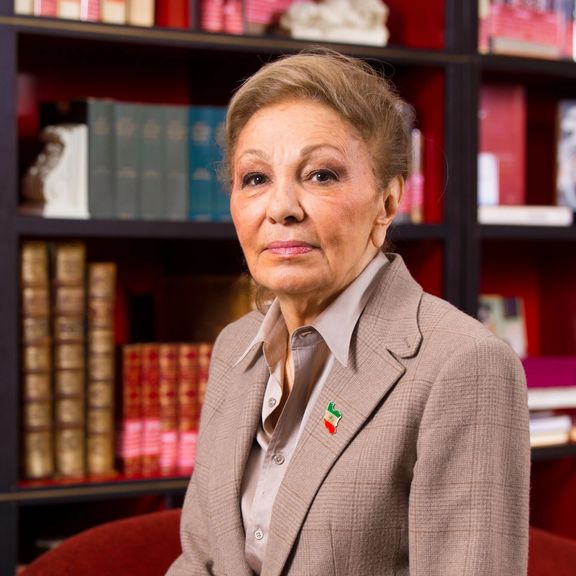
Iran’s exiled queen Farah Pahlavi says if the “ominous” 1979 Islamic Revolution had not taken place in Iran, the country would now be among the pioneering nations of the world.
In a message on the occasion of the 42nd anniversary of her husband’s, Mohammad Reza Shah Pahlavi's death on Wednesday, the queen said the Iranian nation remembers the Pahlavi era while they are “under blood and fire,” of the clerical regime.
“Today, Iran has stood up and despite [government] killings in streets, repression, prisons, torture and executions, Iranian freedom fighters, Iran's unique women, alongside men, do not stop from expressing their outrage with the regime's leaders to the world,” she said.
If the 1979 revolution did not happen, which was caused by the forces of ignorance and the interference of several foreign countries, that misled some of compatriots, today Iran would have been among the world’s advanced countries, instead of being isolated in the international arena and under back-breaking sanctions, Pahlavi added.
Marking the death anniversary of his father, exiled Prince Reza Pahlavi also posted a video message on his Twitter account saying that "Although on that day, they did not see or hear your [the Shah’s] concerns and warnings; today's youth see and have taken the path you showed them."
In June, Reza Pahlavi addressed the nation over the recent waves of protests in the country, calling for a coordinated front to organize anti-government activities.
During protests in recent years people often chant slogans praising the Pahlavi monarchs.
The Prince added that today the biggest opposition and alternative to Islamic Republic is the Iranian people, who deserve to live in the best country possible and will reach their goal.
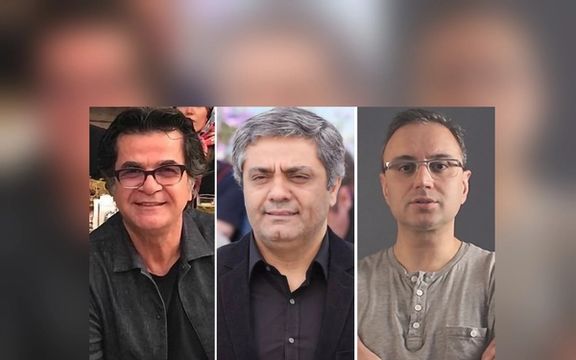
More than 80 renowned French filmmakers and artists have called for the release of jailed Iranian directors Jaafar Panahi, Mohammad Rasoulof and Mostafa Alehahmad.
In a Wednesday statement signed by 81 French intellectuals, including Costa Gavras, Jacques Audiard, Michel Hazanavicius, Christine Angot, Catherine Corsini, Jean-Pierre Dardenne, and Edgar Morin, they said they will not stop supporting their colleagues until they are released.
“We wish to express our anger against these arrests, intimidations and imprisonments... We extend our absolute solidarity to all Iranian authors, artists, filmmakers, who struggle every day to exercise their art, at the cost of their freedom. We admire your courage, your determination, your works, and the solidarity you show. Know that our support will be unrelenting until your release,” said the signatories.
Panahi, who has won numerous awards, including the Golden Leopard at Locarno Festival, the Golden Lion in Venice, and the Silver Bear at the Berlinale, was arrested July 11 as he was protesting the detention of the other award-winning filmmakers, who had been arrested July 8 as part of the Iranian crackdown on the signatories of a collective statement titled “Lay down the gun” issued by more than 100 film industry personalities in the end of May. The statement was a call on Iran’s military and security forces not to use weapons against civilian protesters.
In mid-July, France had urged the Islamic Republic to release the three film makers in the latest criticism of Iran's record over human rights by a major Western powers. Days earlier, the Cannes Film Festival, the Berlinale, the European Film Academy and the International Coalition for Filmmakers at Risk also called for the immediate release of the prominent filmmakers.